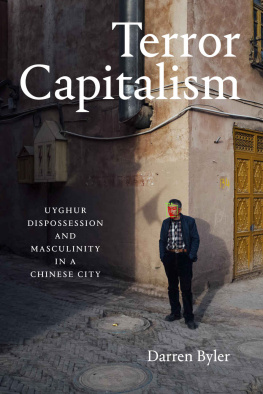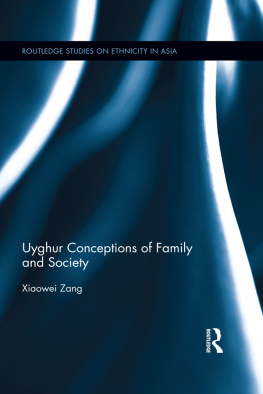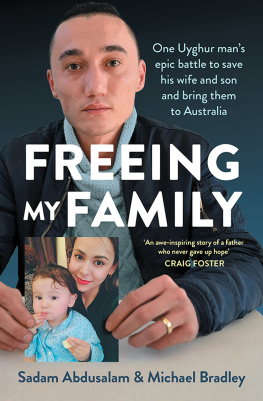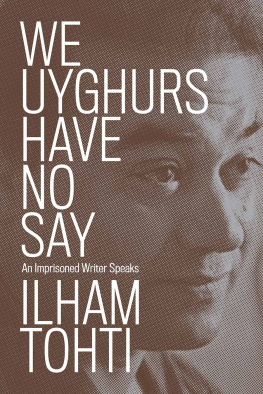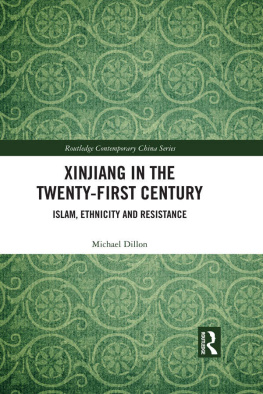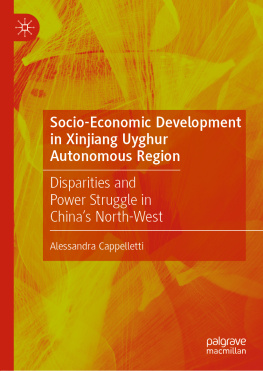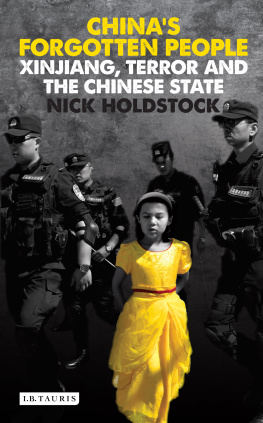Terror Capitalism
UYGHUR DISPOSSESSION AND MASCULINITY IN A CHINESE CITY
Darren Byler
Duke University PressDurham and London2022
2022 DUKE UNIVERSITY PRESS
All rights reserved
Printed in the United States of America on acid-free paper
Designed by Courtney Leigh Richardson
Typeset in Portrait and Univers by Westchester Publishing Services
Library of Congress Cataloging-in-Publication Data
Names: Byler, Darren, author.
Title: Terror capitalism: Uyghur dispossession and masculinity in a Chinese city / Darren Byler.
Description: Durham: Duke University Press, 2021. | Includes bibliographical references and index.
Identifiers: LCCN 2021012914 (print)
LCCN 2021012915 (ebook)
ISBN 9781478015024 (hardcover)
ISBN 9781478017646 (paperback)
ISBN 9781478022268 (ebook)
Subjects: LCSH: Uighur (Turkic people)ChinaXinjiang Uygur ZizhiquSocial conditions. | Detention of personsChinaXinjiang Uygur Zizhiqu. | Human rightsChinaXinjiang Uygur Zizhiqu. | Mineral industriesCorrupt practicesChina. | MenChinaXinjiang Uygur ZizhiquIdentity. | MasculinityChinaXinjiang Uygur Zizhiqu. | Xinjiang Uygur Zizhiqu (China)Ethnic relations. | BISAC: SOCIAL SCIENCE / Anthropology / Cultural & Social | SOCIAL SCIENCE / Privacy & Surveillance (see also POLITICAL SCIENCE / Privacy & Surveillance) | LCGFT: Legislative hearings.
Classification: LCC DS731. U4 B95 2021 (print) | LCC DS731. U4 (ebook) | DDC 951/.6dc23
LC record available at https: //lccn.loc.gov/2021012914
LC ebook record available at https: //lccn.loc.gov/2021012915
Cover art: Maxime Matthys, 2091: The Ministry of Privacy, 2019. Maxime Matthys. Courtesy of the artist.
Contents
This book is based on ethnographic research conducted in both Uyghur and Chinese. I have tried to be careful to render the terms used in the language of origin throughout this text. All first mentions of Uyghur and Chinese terms are italicized. In parenthetical glosses of words I translated into English, I identify the language of origin with an abbreviation before the word: Uy for Uyghur words and Ch for Chinese words. I repeat this procedure if the term has not been used for an extended space in the text. For Uyghur, I use the standard Uyghur Latinization, and for Chinese, I use the standard pinyin transliteration minus the tone markers. In general, I provide only the Chinese for Chinese origin terms, and the Uyghur for Uyghur origin terms. Occasionally, I include both the Uyghur and the Chinese for terms that are directly derived from each other and where I think it will be useful for the reader to understand the term in both languages.
The syllable Uy in the term Uyghur should be pronounced like the French oui. The consonant gh should be pronounced like the ch in the German surname Bach. The Xin in Xinjiang should be pronounced tsin. If that is too difficult, shin is pretty close as well. The jiang should be pronounced gee-yang.
Throughout this book, the names of most of my friends and informants have been disguised to protect their identities. Only the names of the following public figures have been included: Eset Emet, Perhat Tursun, and Tahir Hamut. I mention these names in relation to interviews I conducted with them regarding their publicly available work. The names of state officials have also been given in relation to their freely available publications.
Over the course of writing this book, the impetus of social life in rmchi moved from competing ideas of global Chinese and Islamic contemporaneity to an investment in the so-called Global War on Terror and an economy structured explicitly around ethno-racialized theft of Uyghur labor and sociality. Between 2009 and 2020, Uyghur life was enclosed. The freedoms, desires, and openings that were fostered by Uyghur urban migrant sociality and social media were subtracted. The flourishing of Uyghur cosmopolitan Islamic piety and self-fashioning was used as justification for a new state-funded frontier of global capitalism, a political and economic configuration I call terror capitalism. As I built relationships with dozens of young Uyghur and Han migrants to the city, I became more and more aware of how what began as a developmental state project to draw Uyghurs into the multicultural Chinese nation had been transformed at least in part into a profit-making security project funded by state capital and used as a space for techno-political experimentation in surveillance. As state and private institutions intensified their efforts to reeducate Uyghurs during the so-called Peoples War on Terror beginning in 2014, I came to see firsthand the fear and anxiety that came from regular home invasions and large-scale detentions of suspected reformist Muslims.
Some readers may question whether capitalism is the correct frame for this system and instead expect an analysis that centers on Chinese state terror and authoritarian governance. While these expressions of state power are important aspects of Uyghur reeducation, this book shows that such framings do not fully explain the power of transnational economic and political forces, the autonomy of technology companies and reeducation factories, or the lived experience of settlers who are engineering and profiting from this system., these state proxies are often primarily interested in creating a better life for themselves and their families rather than strictly political motivations. Uyghurs and other Muslims who join the security forces as low-level workers are often confronted with a choice between protecting themselves and their own detention.
Institutionalized ethno-racism and settler colonialism found in both private and public enterprises are major aspects of this frontier in capital accumulation. The political framing of counterterrorism functions in large part as a way of securing funding, claiming resources, and acting with impunity toward Uyghurs and other Muslim peoples. This is not to deny that state-mandated policies of rounding up those who need to be rounded up, showing absolutely no mercy, and prosecutions of state authorities who do not follow these policies, are not central guiding factors in the full establishment of the system. Nor does it deny the way older Maoist-era campaigns to reengineer so-called class enemies inform some of the tactics and organizational shape of the surveillance system (Grose 2019; Leibold 2019; Smith Finley 2019). It is simply showing that, in addition to a more normative reading of political power that places Chinese state authorities at the center of historical change, contemporary configurations of power are also shaped by global capitalism and the colonial relation it carries in frontier locations. Framing the political and economic stakes of Uyghur colonization as a frontier of global capitalism rather than as a manifestation of tyrannical state communism or Asian despotism, as it is often framed by xenophobic North American politicians, also works to refuse a revival of Cold War binarisms. Instead, it shows how the rhetoric of the Global War on Terror and the force of global capitalism come together to create forms of dispossession in new locations.
What was an ethnographer to do in the face of this structural violence? The task of telling the stories of young Uyghur friends who anticipated their arrest and were then disappeared by state contractors into the reeducation system as extremist-separatist-terrorists became a means of holding on to social life even as it began to break apart. As in Audra Simpsons work on Indigenous sovereignty in North America (2014), it meant attempting to refuse to turn their stories into a kind of pornography or objectification of settler-colonial oppression while at the same time acknowledging its totalizing presence. Simpson argues that one way to avoid participating in the violence of the colonial gaze is by writing the political and economic ethnographically. For me, this meant focusing on the way forms of dispossession were lived. Writing the economic ethnographically meant thinking with Uyghurs, and Han settlers, and trying to understand how a confluence of state capital and private technologyenabled forms of ethno-racialization began to subtract social relations and sociality itself. In other words, it meant attempting to understand how the capitalization of information (R. Benjamin 2019; Wark 2019; Zuboff 2019) has begun to enclose the lives of people. Thinking from this vantage point allowed me to consider how counterterrorism both feeds more normative forms of surveillance capitalism and intensifies forms of expropriationthe legalized theft of land and labor permitted by a lack of civil and human protections for ethno-racialized populationsthat are particular to the current global moment. Terror capitalism, a distinct configuration of state capital, techno-political surveillance, and unfree labor, might begin with targeted groups like the Uyghurs, but it might also find similar expression among Muslim populations in Kashmir or with watch-listed Latinx asylum seekers in Texas.
Next page
